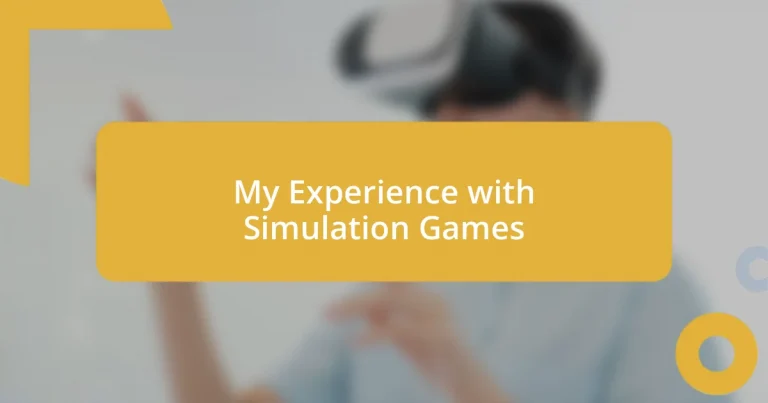Key takeaways:
- Simulation games provide immersive experiences that blend realism and creativity, allowing players to explore complex systems and real-life consequences through various genres.
- Playing simulation games enhances skills such as problem-solving, communication, and time management while fostering emotional connections and a sense of achievement.
- The future of simulation games is likely to incorporate advancements like virtual reality, AI, and collaborative multiplayer experiences, enhancing engagement and community interaction.
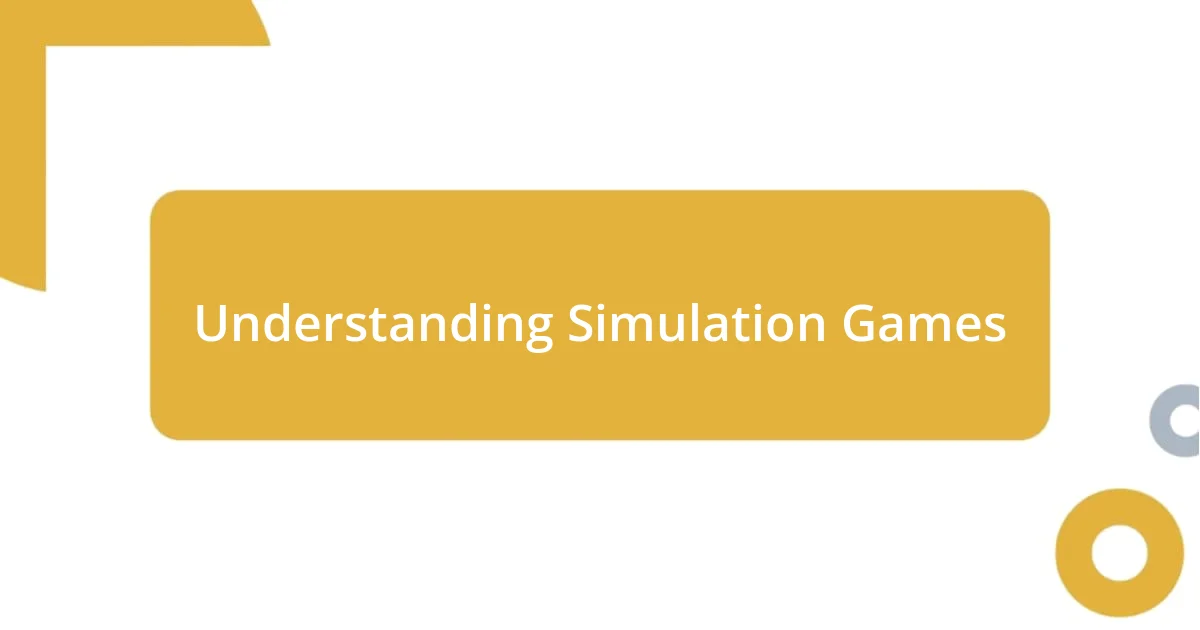
Understanding Simulation Games
Simulation games immerse players in virtual environments, offering a unique blend of realism and creativity. I remember the first time I played a flight simulator; it was exhilarating to control a plane and navigate through clouds as if I were really soaring through the sky. Have you ever felt that rush of excitement while mastering a skill in a game that mirrors real life?
What fascinates me most about simulation games is their ability to replicate complex systems and situations, creating both educational and entertaining experiences. I’ve spent countless hours managing virtual cities or businesses, and each decision felt weighty—like I was truly shaping the world around me. This sense of responsibility brings to light a crucial question: how do these games teach us about real-life consequences?
Moreover, the variety of simulation games appeals to a broad audience. From farming simulators to life simulators, each genre offers a different perspective on everyday experiences, allowing players to explore and experiment. It’s like playing an alternate reality where exploration is endless and the only limit is your imagination. Haven’t we all found ourselves lost in a world that feels just as vibrant as our own?
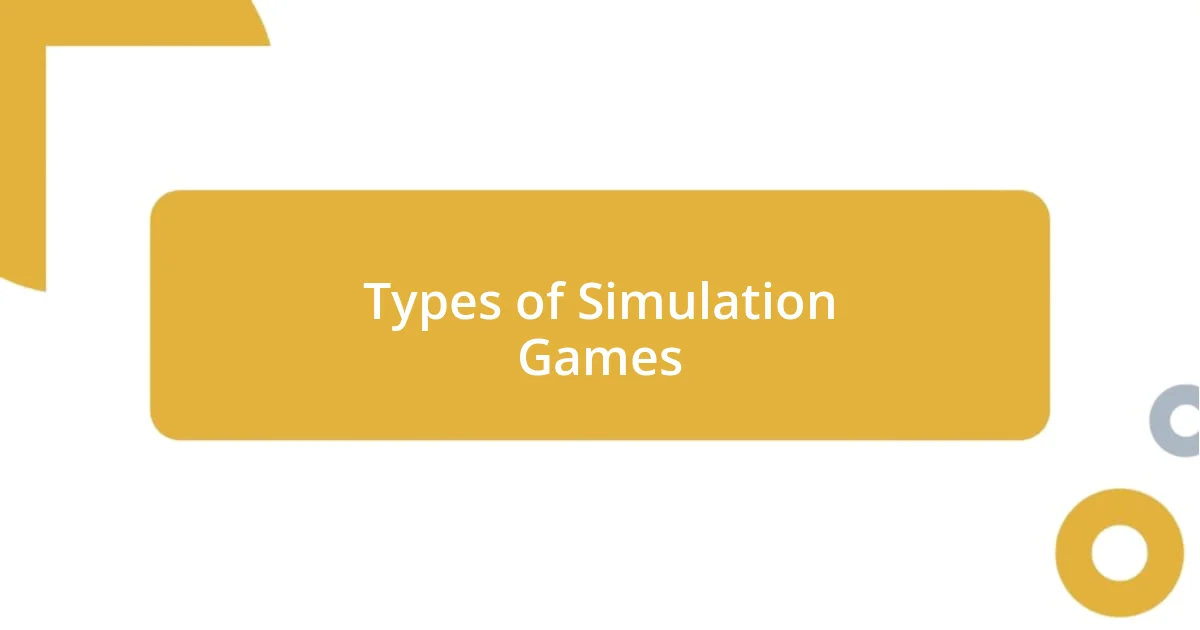
Types of Simulation Games
When it comes to simulation games, the variety is truly captivating. I’ve dipped my toes into several categories that each offer something unique. For instance, I found myself completely absorbed in life simulation games like The Sims, where managing relationships and building a dream home felt like a reflection of my own aspirations and challenges. On the other hand, racing simulations like Gran Turismo allow players to experience the thrill of speed and competition without the real-world risks. Each type caters to different interests and evokes different emotions, making it delightful to discover.
Here’s a quick breakdown of some popular types of simulation games:
- Life Simulation: Focuses on managing characters’ lives and interpersonal relationships (e.g., The Sims).
- Flight Simulation: Replicates flying aircraft, offering realistic controls and environments (e.g., Microsoft Flight Simulator).
- Vehicle Simulation: Includes driving and racing vehicles in realistic settings (e.g., Forza Horizon).
- City-Building Simulation: Tasks players with constructing and managing cities (e.g., SimCity).
- Farming Simulation: Involves managing a farm, from planting crops to raising livestock (e.g., Stardew Valley).
- Sports Simulation: Mimics real-life sports scenarios and management (e.g., FIFA).
Each type has its own charm and intricacies that draw players into immersive worlds, allowing us to shape experiences that resonate with our real lives.
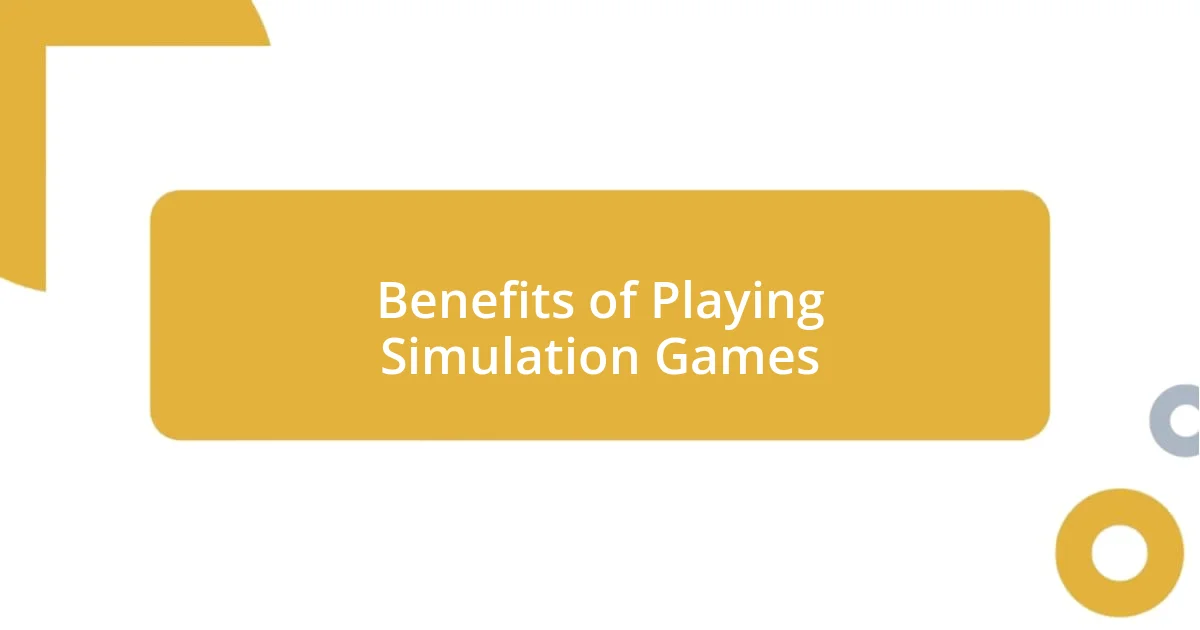
Benefits of Playing Simulation Games
Playing simulation games offers a range of benefits that I’ve experienced firsthand. For one, these games sharpen problem-solving skills by presenting challenges that require careful planning and decision-making. I distinctly remember being knee-deep in a city-building game, where I had to juggle budget constraints while trying to expand my virtual metropolis. The process taught me not just about resource management but also about the importance of strategic thinking in real life.
Interestingly, simulation games create a fantastic space for practicing new skills. When I first tried my hand at a flight simulator, I was amazed at how the game replicated the intricacies of piloting an aircraft. The experience didn’t just provide adrenaline; it also sparked a greater interest in aviation. This kind of learning through play is invaluable and makes the lessons learned feel much more tangible and engaging.
Finally, the emotional connections we develop with simulation games can foster a sense of achievement and fulfillment. I often find myself emotionally invested in my game characters’ journeys, celebrating their successes and empathizing with their struggles. This kind of engagement can lead to stress relief and a sense of accomplishment, much like the satisfaction of achieving a personal goal in real life.
| Benefit | Description |
|---|---|
| Problem-solving | Sharpens critical thinking through strategic decision-making. |
| Skill development | Offers practice in various skills like management and navigation. |
| Emotional connections | Fosters feelings of achievement and empathy through immersive storytelling. |
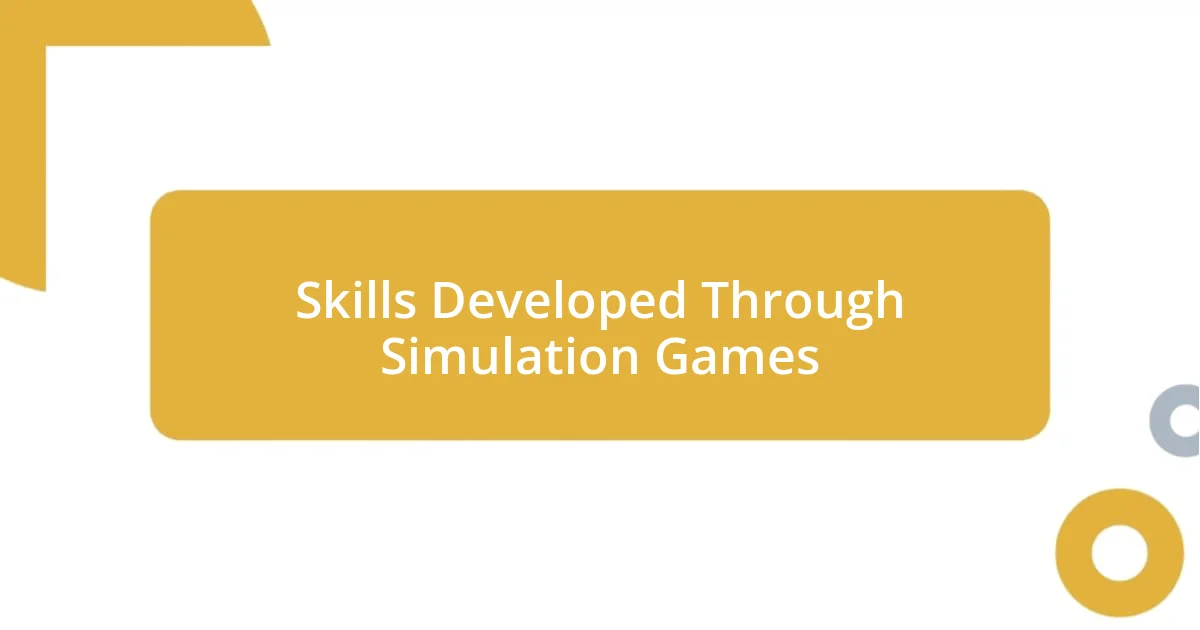
Skills Developed Through Simulation Games
Diving into simulation games has undeniably sharpened my critical thinking skills. I remember one session playing Cities: Skylines, where a sudden budget crisis forced me to prioritize public services while considering the citizens’ happiness. This exercise taught me that every decision has consequences—not just in the game but in real life too.
Communication has also bloomed for me through multiplayer simulations. When I joined a virtual farming community in Stardew Valley, I found myself coordinating with others to optimize our harvests. It was fascinating to see how building relationships online mirrored my in-person communication experiences, reinforcing trust and teamwork in a playful setting.
Lastly, I can’t overlook the time management skills I’ve honed. In The Sims, managing my character’s daily activities while balancing their career and social life felt oddly reflective of my own daily juggle. It’s amazing how these virtual responsibilities can translate to real-world skills, helping me prioritize tasks more effectively in my day-to-day life. Have you ever considered how a game can teach you so much about time management? I find it incredible how simulation games serve as both an escape and a valuable teacher.

Tips for Maximizing Enjoyment
To truly maximize enjoyment in simulation games, I find that setting personal goals can make a huge difference. For instance, instead of simply trying to beat a level, I challenge myself to create the most efficient city layout in my city-building game. This added layer of purpose turns each session into a rewarding adventure where I see how my skills evolve and where I can improve. Have you ever set a unique goal in your gameplay? It can make achievements feel more substantial.
Another tip I swear by is engaging with the community surrounding a game. Jumping onto forums or social media groups not only provides fresh perspectives but also opens doors to sharing experiences and strategies. I remember sharing my The Sims work with others online; the feedback I received was insightful and made me realize how each player interprets the game differently. It’s fascinating to see how our collective creativity enhances the fun!
Lastly, don’t hesitate to tweak your gaming experience to suit your preferences. Many simulation games offer mods that can add new elements and make the gameplay even more exciting. I once downloaded a weather mod for my city game, and it completely transformed how I approached city planning. Sometimes, shaking things up can reignite that spark of enjoyment—what new twist would you add to your favorite simulation game?
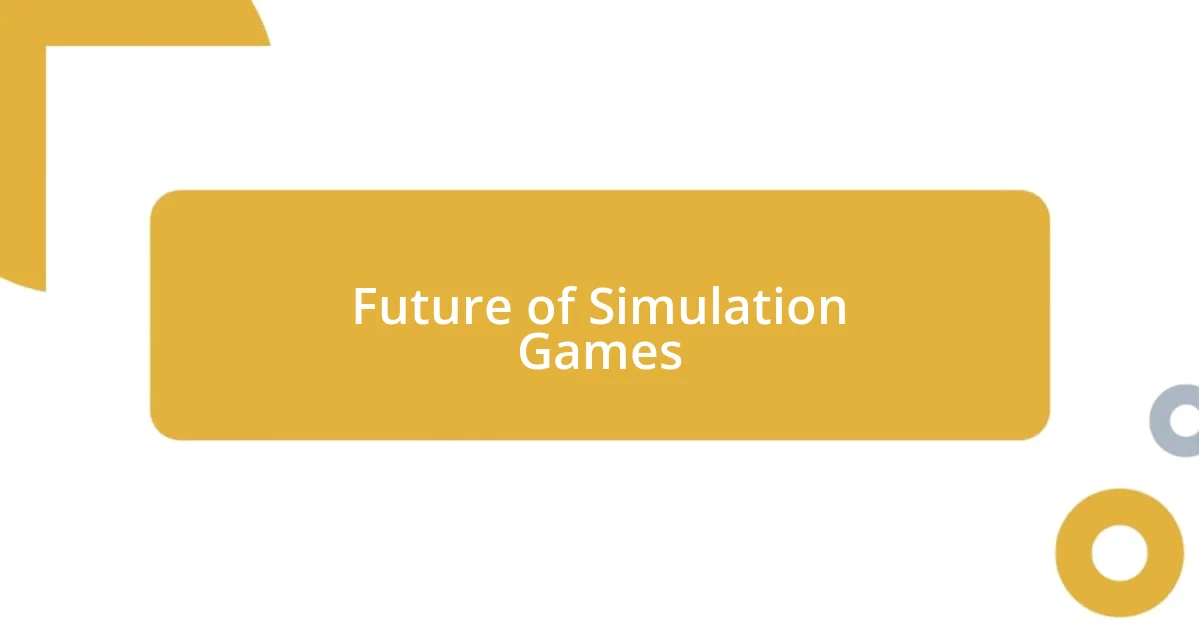
Future of Simulation Games
As I look ahead, I can see simulation games evolving in ways that are both exciting and unexpected. Consider the advancements in virtual reality: I remember playing a demo for a VR farming simulator, and it felt like I was really immersed in the world, tending to crops and livestock. Could this level of engagement open new doors for empathy and understanding in players? Imagine experiencing daily life in diverse cultures through simulation games, bridging gaps between personal experiences and global perspectives.
Moreover, the integration of AI is likely to transform how we interact within these games. I once played a simulation where the NPCs (non-player characters) used complex algorithms to respond to my actions, creating a more dynamic experience. It got me thinking: what if my in-game decisions had an even more profound impact on the virtual community? The potential for storytelling in simulation games could become richer, offering narratives shaped by our choices rather than fixed plots.
Finally, with the growth of online multiplayer experiences, there’s a unique opportunity for collaborative projects. I recall joining forces with friends to build an entire city in Cities: Skylines, each of us managing different sections. It highlighted the thrill of teamwork in achieving a common goal. How will future games innovate these collaborative elements? I truly believe that this social aspect will redefine community engagement in gaming, turning solitary experiences into shared adventures.












